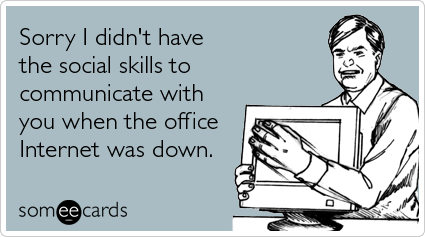Well, a new study says that humblebragging is actually far worse than straight-up, in-your-face bragging. So let's just tell everyone up-front how completely amazeballs we are, and be done with it already!
At work, trying to land a spot on The Humblebragging Hall of Fame might not be the quick ticket to job advancement after all.
Simply put: Nobody likes a braggart.
However, we really don't respond well to the characters in our lives who consistently manage to humblebrag in 140 characters or less.
Two business professors from "a school" in "Cambridge, Massachusetts" that we didn't even want to go to, we just sent an application in for fun (cue eye roll...) looked into the state of online bragging-disguised-as-self-loathing. They found that on Twitter at least, humblebragging is the best way to end up being disliked and thought of as incompetent.
The study revealed something else, too: We tend to create personal rankings around rank rancor. We'll take an outright complainer over a clever humblebragger any day of the week. We'll also take a clear braggart over a humblebraggart, if we must choose.
Heck, we'll even take the whiny friend who can't stop straight-up bragging about herself over the "friend" who utters anything like this. (Warning: Some video language may be NSFW.)
In sum, the humblebraggart is at the very bottom of our personal go-to friend/work colleague list! Yet, we must deal with humblebraggarts every day on the job. It starts when we're looking for work. As Fortune reports:
The most common humblebrag may be the job interview game where the questioner asks prospects what their biggest weaknesses are, while the interviewees go one about the problems of being a perfectionist or of being accommodating and easy to get along with.Oh, yes. My biggest "weakness," Mr. or Ms. Job Interviewer, is that I work too hard and I'm way too dedicated.Oh, the humble beginnings. Oh, the difficulties of fame and fortune. Oh, would someone please stop talking.
Ugh. No wonder hiring the right person for the job is so hard these days! Job candidates have no leeway to admit even the slightest weakness, so hiring managers can't find out exactly what they would be getting. If I were a hiring manager, then I would love to hear someone say: "I'm great at everything in the job description, except for one thing. I'm not as experienced in..."
Wow, thanks for being so bravely honest and up-front about your skills and expertise! How refreshing! I'm getting a good vibe here. Besides, there's no such thing as a perfect job candidate. Everyone's going to need a little bit of on-the-job training somewhere, what with the world of work moving so fast these days.
So what does all this humblebragging mean in a workplace context, where everything from getting a job to keeping a job to being promoted is built on the ability to self-promote in the right ways, and at strategic moments? We do need to brag sometimes (just ask a truly humble person how hard it is, too). The big problem with the humblebrag is that others immediately pick up on the calculating nature behind it. The Beatles wrote the ultimate song years ago about humblebragging.
We respond best to clear intentions, and the outright braggart has nothing but clear intentions. That is, to tell us repeatedly how amazing he is, all the time. Sure, the braggart is annoying in his breathtaking level of self-regard and admiration, but at least he's honest and up-front about it. We know where we stand, which, of course, is in his shadow. We can all appreciate someone who keeps it real.
When we want to brag, then we should simply brag. Let. It. All. Out. Be honest in it, because everyone else will respond better to it. Let's refuse to disguise personal accomplishments behind a false sense of humility, because everyone sees right through it and thinks less of us for doing it. Hmm. I think that's pretty much it.

ConversionConversion EmoticonEmoticon